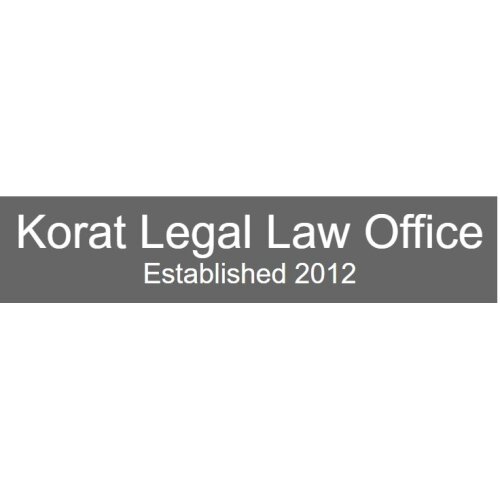Best Renewable & Alternative Energy Lawyers in Nakhon Ratchasima
Share your needs with us, get contacted by law firms.
Free. Takes 2 min.
List of the best lawyers in Nakhon Ratchasima, Thailand
About Renewable & Alternative Energy Law in Nakhon Ratchasima, Thailand
Nakhon Ratchasima, often referred to as Korat, is one of Thailand's fastest developing provinces in the field of renewable and alternative energy. As the nation pushes toward sustainable growth and energy independence under its Power Development Plan (PDP), local governments and private investors in Nakhon Ratchasima are increasingly participating in the development, production, and use of solar, wind, biomass, and other renewable resources. The legal environment surrounding these activities is shaped by both national policies and locally enforced regulations, creating unique compliance challenges and opportunities for businesses, investors, and landowners.
Why You May Need a Lawyer
Legal guidance is essential for anyone considering involvement in renewable or alternative energy projects in Nakhon Ratchasima. Common situations where you may require legal help include:
- Securing land rights or negotiating lease agreements for solar farms or wind turbines
- Navigating complex permitting and licensing processes with local authorities
- Complying with environmental protection and zoning regulations
- Negotiating power purchase agreements (PPAs) with the Provincial Electricity Authority or other buyers
- Understanding incentives, tax credits, and subsidies for renewable energy projects
- Handling disputes over land use, boundary issues, or compensation
- Establishing joint ventures or partnerships with Thai and international investors
- Dealing with intellectual property concerns around new energy technologies
A specialized attorney can help ensure compliance, minimize risks, protect your investments, and facilitate smoother project execution.
Local Laws Overview
Renewable and alternative energy development in Nakhon Ratchasima is subject to a mix of national and local regulations. Key aspects include:
- Licensing and Permits - Projects must obtain relevant permits from provincial authorities, including Environmental Impact Assessments (EIA) for larger facilities.
- Land Use - Local zoning laws determine where renewable energy projects can be developed. Agricultural land may require rezoning or special permission.
- Incentives and Subsidies - The Thai government and local authorities offer support schemes, such as feed-in tariffs, tax breaks, and low interest loans for eligible projects.
- Grid Connection - Rules govern how projects connect to the main grid, including technical, safety, and contractual requirements with the Provincial Electricity Authority.
- Environmental Regulations - Local and national laws restrict emissions, manage waste, and require restoration of land post-operation.
- Cross-border and Foreign Investment - The Foreign Business Act and Investment Promotion Act outline specific rules for foreign individuals or companies investing in energy projects.
Frequently Asked Questions
What types of renewable energy projects are common in Nakhon Ratchasima?
The province is known for solar farms, wind turbines, and biomass projects using agricultural residues. Rooftop solar and small-scale hydropower are also emerging sectors.
Do I need government approval for a solar farm?
Yes, government permits are required, including local planning consent, grid connection agreements, and sometimes environmental approvals.
Are foreign investors allowed to own renewable energy projects?
Foreign investment is possible but regulated. Ownership structures need to comply with the Foreign Business Act and may require setting up a Thai majority company or obtaining special investment promotion.
How are land rights handled for renewable energy projects?
You may acquire land, lease it from the owner, or reach a partnership agreement. Legal advice is essential to create valid contracts and avoid future disputes.
What are the incentives for renewable energy projects in Thailand?
Incentives may include tax exemptions, subsidies, feed-in tariffs, and tailored investment packages through the Board of Investment (BOI).
What environmental laws apply to energy projects?
Projects must comply with national and provincial environmental regulations. Large facilities usually require an Environmental Impact Assessment and ongoing compliance reporting.
Who is responsible for connecting renewable energy facilities to the power grid?
Project developers must apply to the Provincial Electricity Authority and satisfy technical, safety, and legal requirements before connecting to the grid.
Can I sell electricity generated from my project?
Yes, but sales must be underpinned by a Power Purchase Agreement, typically with the Provincial Electricity Authority or private buyers, under regulated conditions.
What happens if local zoning laws do not permit renewable energy projects?
You must seek rezoning or special permission from local authorities. This process can be complex, requiring negotiation and compliance with local planning laws.
How can a lawyer help during the early project stages?
A lawyer can guide you on site selection, due diligence, contract negotiation, compliance strategies, and help you navigate regulatory processes.
Additional Resources
If you need more information or support, the following resources may be useful:
- Provincial Electricity Authority (PEA) - For grid connection and power purchase details
- Board of Investment (BOI) Thailand - For information about investment incentives
- Department of Alternative Energy Development and Efficiency (DEDE) - For technical standards and policy guidance
- Nakhon Ratchasima Provincial Administrative Organization - For local permits and land use regulations
- Ministry of Energy, Thailand - For nationwide policies and updates
- Local law firms specializing in renewable energy
Next Steps
If you are looking to start or expand a renewable or alternative energy project in Nakhon Ratchasima, consider the following steps:
- Define the scope and goals of your project, including site selection and technology type.
- Gather initial information on relevant regulations and incentives.
- Consult a local attorney experienced in renewable energy law to perform due diligence and assess legal risks.
- Work with your legal advisor to prepare necessary contracts, applications, and compliance documentation.
- Submit applications for permits and engage with local authorities as advised.
- Negotiate Power Purchase Agreements and other commercial arrangements with the support of your lawyer.
- Continue to seek legal guidance for ongoing compliance and dispute resolution as your project progresses.
Taking these steps will help ensure your renewable energy venture in Nakhon Ratchasima is legally secure and positioned for long-term success.
Lawzana helps you find the best lawyers and law firms in Nakhon Ratchasima through a curated and pre-screened list of qualified legal professionals. Our platform offers rankings and detailed profiles of attorneys and law firms, allowing you to compare based on practice areas, including Renewable & Alternative Energy, experience, and client feedback.
Each profile includes a description of the firm's areas of practice, client reviews, team members and partners, year of establishment, spoken languages, office locations, contact information, social media presence, and any published articles or resources. Most firms on our platform speak English and are experienced in both local and international legal matters.
Get a quote from top-rated law firms in Nakhon Ratchasima, Thailand — quickly, securely, and without unnecessary hassle.
Disclaimer:
The information provided on this page is for general informational purposes only and does not constitute legal advice. While we strive to ensure the accuracy and relevance of the content, legal information may change over time, and interpretations of the law can vary. You should always consult with a qualified legal professional for advice specific to your situation.
We disclaim all liability for actions taken or not taken based on the content of this page. If you believe any information is incorrect or outdated, please contact us, and we will review and update it where appropriate.









